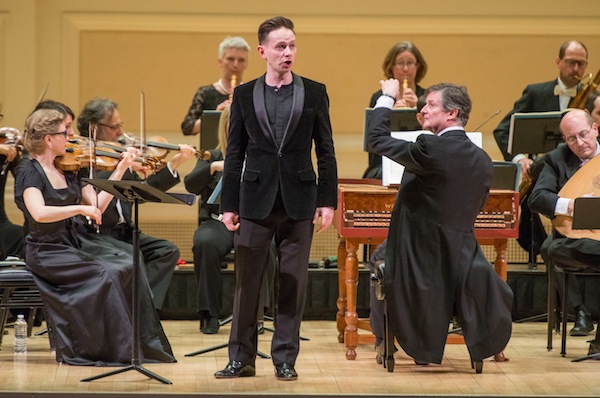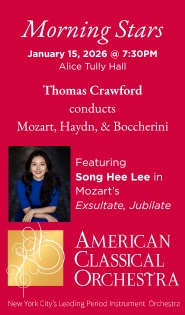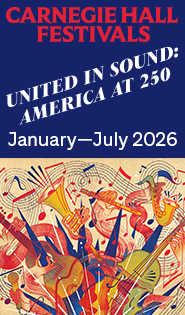A Handel afternoon to remember with English Concert’s “Rinaldo”

Iestyn Davies sang the title role in Handel’s “Rinaldo” with Harry Bicket and the English Concert Sunday afternoon at Carnegie Hall. File photo: Stephanie Berger
First, the bad news: one will have to wait until April of next year to hear the English Concert and conductor Harry Bicket bring another Handel opera to Carnegie Hall.
And that is indeed unfortunate, because their Sunday performance of Rinaldo was so wonderful that the pain of its concluding was nearly as acute as the pleasure of its hearing.
The Concert’s Handel performances—minimally staged—have been among the best classical music experiences over the past several years, and so one entered the hall Sunday afternoon with a sense of anticipation. What the performers delivered vastly exceeded that.
Rinaldo comes from early in the composer’s career (1711) and its success in London was one of the primary reasons for the composer to emigrate there from Germany and take English citizenship.
The story, by Aaron Hill, is based on Torquato Tasso’s poem Gerusalemme liberata. Rinaldo is a nobleman, fighting under Goffredo, leader of the First Crusade. The two, with Goffredo’s brother Eustazio, are fighting against the Saracen king Argante for control of Jerusalem. Rinaldo is betrothed to Goffredo’s daughter, Almirena, while Argante loves the sorceress Armida. Hoping to lead Argante to victory, Armida causes a lot of mischief, including kidnapping Almirena and disguises herself as Almirena to trick Rinaldo. Argante promptly falls for what he thinks is Goffredo’s daughter, while Armida herself develops a crush on Rinaldo. After a little magic, and a big battle-depicted musically—everyone is saved and Christianity rules the day.
Inside this contraption is some of the finest music Handel ever wrote. There is so much invention that across the three-hour duration one is constantly either surprised by an unexpected rhythm or by what seems infinite depths of beautiful, soulful expression. This is a towering baroque opera and a masterpiece of dramatic music.
Handel was a generous composer and all the characters, including the secondary and tertiary, have their chance to shine. And with this in mind, Bicket assembled yet another all-star cast; countertenor Iestyn Davies (one of the leading Handel singers on the scene) as Rinaldo, mezzo-soprano Sasha Cooke as Goffredo, sopranos Joélle Harvey as Almirena and Jane Archibald as Armida, bass-baritone Luca Pisaroni as Argante, and countertenor Jakub Józef Orlinski as Eustazio.
The other main character was the orchestra itself. The English Concert stands out from other period instrument groups for the lovely, light sheen of their sound, and their blend of instrumental timbres, an emulsification heard mostly in modern instrument ensembles. There is plenty of character in the playing, but it comes through a sense of sophisticated musicality, rather than just tone color.
They are also virtuosic, and this is a virtuosic score for everyone, singers and instrumentalists. For the singers, this meant a range of expression, from sixteenth-note runs—Pisaroni showed astonishing breath control in “Sibilar gli angui”—or meltingly, achingly graceful phrases full of feeling, like Rinaldo’s and Almirena’s famous arias, “Cara sposa” and “Lascia ch’io pianga.”
Davies was exceptional. his dark, strong countertenor marking fine contrast to Orlinski’s warm, mellow sound, the former carrying gravity, while the latter filled in narrative moments with companionable good feeling. Davies, Cooke, and Pisaroni performed with dramatic weight, building their characters with a seriousness that went beyond just the notes.
Both sopranos had fullness and weight in their coloraturas—their lines were long and had musical meaning all the way through passages that, in other hands, might be just ornamental.
Amid the constant delights, Harvey’s singing stood out for its extra measure of beauty. Her voice had a pure, unforced loveliness, her vibrato was perfectly shaped and judiciously used, much more in “Combatti da forte” than in “Lascia,” where it added an affecting touch of heartache.
Archibald impressed with her vital force, in both angry and humorous moments. Handel was to treat this character more seriously in his opera Armida, but in Rinaldo she and Argante are more than a little comical and objects of some ridicule.
Handel, like Mozart after him, made his characters human and touching. So musically Armida is not simply angry, she is frustrated and hurt. One of the high points of the opera, and of the performance, was the concluding scene of Act II. Here, Armida’s aria “Vo’far guerra” is interspersed with a virtuosic harpsichord solo. This added tremendous art to her desire for war, especially in Tom Foster’s astonishing performance. His playing was fleet, liquid, and full of panache with some exciting harmonic excursions. It was so fine that, as the audience applauded the whole performance at the end of the act, so did the Concert members applaud Foster.
Another exceptional instrumental moment was the Act I scene in a garden. As Almirena sings “Augelleti,” birds chirp around her, and one of them breaks into simply magical song. This was played by recordist Tabea Debus, and was so full of beauty and deep, natural musicality that one listened in more than a little awe.
So fine was the instrumental playing, that in Rinaldo’s aria “Or la tromba,” one’s attention was drawn away from Davies’ excellent singing to Mark Bennett’s trumpet playing. His sound was brilliant and on the valveless version his intonation was perfect and his trills were jaw-dropping.
Noting these soloists is some measure of the rare level of these concerts. There’s the old adage that a chain is only as strong as its weakest link, and the weakest link in these ensembles is consistently stronger than the strongest link in many other performances. Even countertenor James Hall, playing various small roles, stood out for the loveliness of his voice, and the orchestral playing to introduce “Ah, crudel,” was so expressive that one almost wanted a delay before Armida’s entrance. But of course that turned out to be yet another ravishing moment.




Posted Mar 26, 2018 at 4:45 pm by Karen Patricia Smith
I was fortunate enough to hear this performance twice; once at the Barbican Concert Hall in London on Tuesday, March 13th, and then again upon my return to New York, on Sunday afternoon at Carnegie Hall. Both performances were indeed consistently excellent.
It is important to re-emphasize the fact that Handel has a very large following in New York, and
this is proven by the fact that Carnegie Hall was packed on Sunday afternoon. We need more Handel in New York! Carnegie Hall should be complimented for their dedication to the
composer, demonstrated through their willingness to present this series of Handel operas. I wish this dedication were as evident in the offerings presented by the Metropolitan Opera!
Posted Mar 26, 2018 at 9:03 pm by CastaDiva
Yes, it was an exquisite performance indeed, and Bicket always assembles a fine cast of singers for these annual treats of baroque opera at Carnegie. But why did the critic fail to mention the third countertenor, James Hall? He did triple duty, as Araldo, a Woman, and a Christian Magician, and was very good, too. Indeed, Davies and Hall alternated in the singing role of Farinelli in the recent run on Broadway of the play Farinelli and the King. I heard Davies in that role where he sang, exquisitely, excerpts from Handel operas, most from Rinaldo, and I was thrilled to hear him in the entire opera yesterday.
Posted Mar 27, 2018 at 7:09 am by Beverly Bullock
Splendid review of a splendid performance.